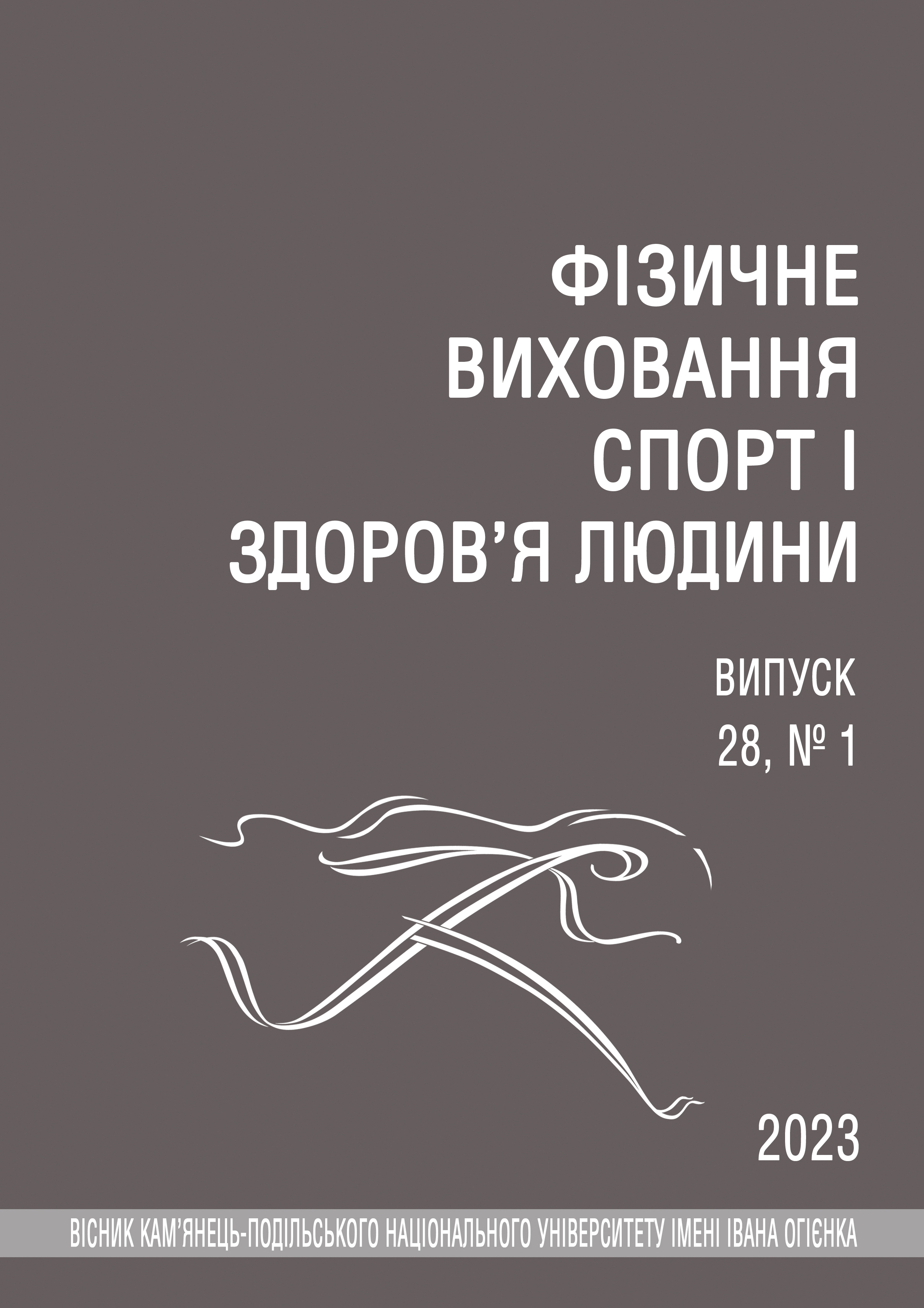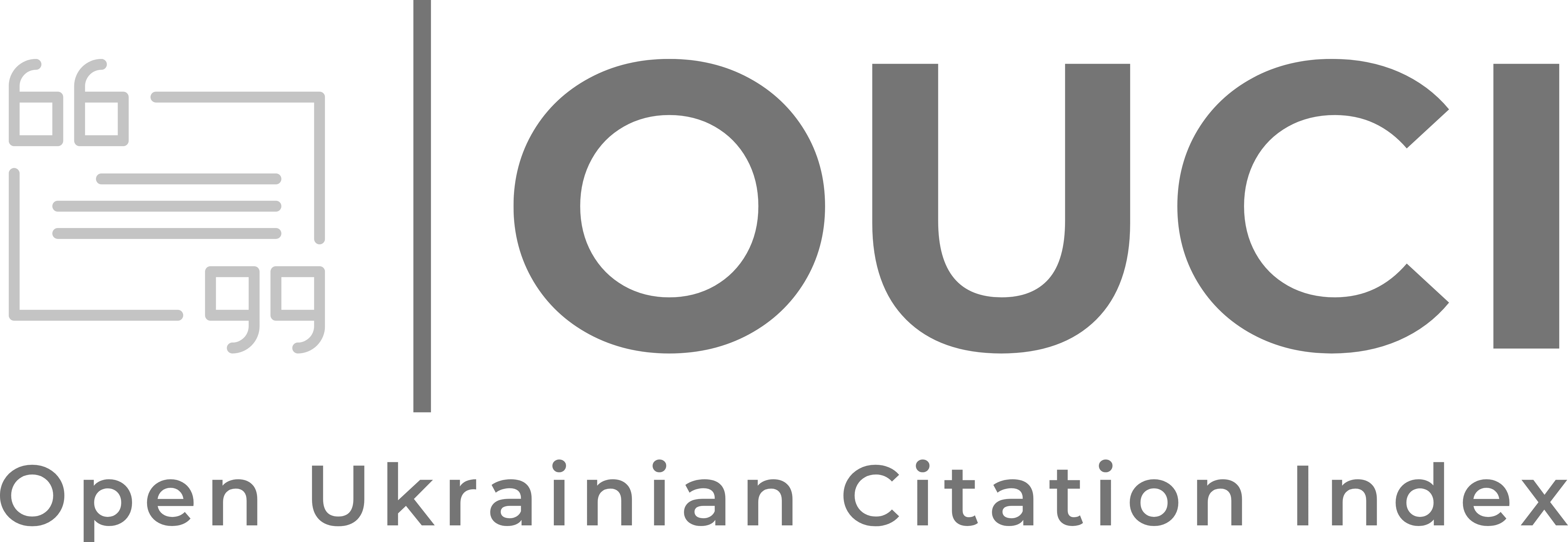Мотиваційно-ціннісне ставлення курсантів до занять з фізичної підготовки і спорту
DOI:
https://doi.org/10.32626/2309-8082.2023-28(1).17-23Ключові слова:
мотивація, фізична підготовка, спортивно-масова робота, спортивне орієнтування, курсантАнотація
Проблема якісної підготовки майбутніх офіцерів Сухопутних військ Збройних Сил України вимагає не тільки високого рівня їх підготовленості за обраною спеціальністю, але й розвитку фізичних та психологічних якостей, сформованості військово[1]прикладних рухових умінь та навичок, що сприятиме забезпеченню ефективного виконання завдань за призначенням. Досягненню вказаних завдань сприяють заняття військово-приклад[1]ними видами спорту, серед яких важливе місце посідає спортивне орієнтування. Впровадження спортивного орієнтування до фізичної підготовки курсантів вищих військових навчальних закладів у години спортивно-масової роботи сприятиме також покращанню їх мотивації до регулярної рухової активності, підвищенню інтересу до систематичних занять фізичними вправами та спортом. Мета й методи. Мета дослідити мотиваційно-ціннісне ставлення курсантів до занять з фізичної підготовки і спорту. Методи: аналіз, синтез та узагальнення літературних джерел, анкетування. В анкетуванні взяли участь 504 військовослужбовця (492 курсанта, 12 офіцерів). Дослідження проводилося у 2020- 2021 роках у Житомирському військовому інституту імені С. П. Корольова. Результати. Виявлено, що зі збільшенням року навчання у курсантів знижується інтерес до традиційних занять у години спортивно-масової роботи (з 51.3 % на 1-му курсі до 17.9 % на 5-му). З’ясовано, що основною причиною зазначеної проблеми є недостатнє різноманіття сучасних засобів фізичної підготовки і спорту. Встановлено, що 100 % опитаних курсантів та офіцерів випускників, які під час навчання займалися спортивним орієнтуванням, переконані у ефективності цього виду спорту у формуванні військово-прикладних рухових навичок та вмінь курсантів та удосконаленні їх фізичної підготовленості. Висновки. Результати проведеного анкетування свідчать про доцільність впровадження до спортивно-масової роботи спортивного орієнтування, як одного з ефективних сучасних військово-прикладних видів спорту, для покращення мотиваційно-ціннісного ставлення курсантів до занять фізичною підготовкою і спортом під час навчання у вищих військових навчальних закладів.
Посилання
Romanchuk, S. V. (2012), Fizychna pidhotovka kursantiv viiskovykh navchalnykh zakladiv Sukhoputnykh viisk Zbroinykh Syl Ukrainy [Physical training of cadets of military educational institutions of the Land Forces of the Armed Forces of Ukraine]. ASV, Lviv. 408 p. [in Ukraine].
Vandenko, V. V. (2014), “Fizychna pidhotovka v umovakh Antyterorystychnoi operatsii” [Physical training in the conditions of an antiterrorist operation.]. Physical training of personnel of the Armed Forces, other military formations and law enforcement agencies of Ukraine. Experience, modernity, problems and prospects for development : materials of the scientific and methodological conference. Kyiv. NUOU. pp. 52–54. [in Ukraine].
Romanchuk, S. V., Oderov, A. M., Fedak, S. S., Afonin, V. M., Lesko, O. M. (2017), “Doslidzhennia subiektyvnoi dumky uchasnykiv boiovykh dii shchodo vazhlyvosti fizychnoi pidhotovlenosti viiskovosluzhbovtsiv” [Research of the subjective opinion of combatants regarding the importance of physical fitness of military personnel]. Scientific journal of the National Pedagogical University named after M. P. Drahomanov. Series 15. Scientific and pedagogical problems of physical culture (physical culture and sports), 5K(86), pp. 286–292. [in Ukraine].
Antoshkiv, Yu. M. (2009), “Motyvuvannia kursantiv ta studentiv do zaniatʹ fizychnym vykhovanniam i sportom. Visnyk Lvivskoho derzhavnoho universytetu bezpeky zhyttiediialnosti” [Motivating cadets and students to engage in physical education and sports]. Bulletin of the Lviv State University of Life Safety, collection of scientific works Lviv, № 3, pp. 197–200. [in Ukraine].
Banah, V. (2021), “Efektyvnistʹ eksperymentalʹnoyi rozrobky u formuvanni motyvatsiyi zdobuvachiv vyshchoyi osvity do fizychnoyi aktyvnostiu pozaavdytornyy chas” [The effectiveness of experimental development in the formation of motivation of higher education students to physical activity in extracurricular activities]. Bulletin of Kamyanets-Podilskyi Ivan Ogiienko National University. Physical Education, Sports and Human Health, 23, pp. 20-28. doi: 10.32626/2309-8082.2021-22.20-28 [in Ukraine].
Sportyvno-masova robota v Zbroinykh Sylakh Ukrainy. [Sports and mass work in the Armed Forces of Ukraine]. – URL: https://www.uzhnu.edu.ua/en/infocentre/get/24486 .
Romanchuk, S. V. (2012), “Viiskovi bahatoborstva ta viiskovo-prykladni vydy sportu v systemi pidhotovky fakhivtsiv Zbroinykh Syl Ukrainy” [Military all-around events and military-applied sports in the system of training specialists of the Armed Forces of Ukraine]. Bulletin of Kamyanets-Podilskyi Ivan Ogiienko National University. Physical Education, Sports and Human Health, 5, pp. 223–230 [in Ukraine].
Yuriev, S. O., Mykhniuk, O. V., Rodionov, M. O., Nikitin, A. M., Bykov, R. H., Polozenko, D. P., Pidopryhora, M. V., Arefieva, L. P. (2021), “Rol ta mistse viiskovo-prykladnykh vydiv sportu u fizychnii pidhotovtsi maibutnikh ofitseriv Zbroinykh Syl Ukrainy” [The role and place of applied military sports in the physical training of future officers of the Armed Forces of Ukraine]. Scientific journal of the National Pedagogical University named after M. P. Drahomanov. Series 15. Scientific and pedagogical problems of physical culture (physical culture and sports), Issue 5(136), pp. 149-152.doi: 10.31392/NPU-nc.series15.2021.5(135).36 [in Ukraine].
Mykhniuk, O. V., Rusanivskyi, S. V., Bezpalyi, S. M., Fedchenko, O. S., Kruk, O. M., Lysyk, R. V., Sivakov, V. P., Shtoma, V. D. (2021), “Sportyvne oriientuvannia yak zasib fizychnoi pidhotovky kursantiv” [Sports orientation as a means of physical training of cadets]. Scientific journal of the National Pedagogical University named after M. P. Drahomanov. Series 15. Scientific and pedagogical problems of physical culture (physical culture and sports), Issue 11(143), pp. 96-99. doi: 10.31392/NPU-nc.series15.2021.11(143).20 [in Ukraine].
Starchuk, O. O., Prontenko, V. V., Mykhniuk, O. V., Barkovskyi, D. O., Rodionov, M. O., Krasnopolskyi, M. M., Korak, Ye. O. (2021), “Teoretyko-metodychni osnovy formuvannia fizychnoi hotovnosti kursantiv zasobamy sportyvnoho oriientuvannia” [Theoretical and methodological foundations of formation of physical readiness of cadets by means of sports orientation]. Scientific journal of the National Pedagogical University named after M. P. Drahomanov. Series 15. Scientific and pedagogical problems of physical culture (physical culture and sports), Issue 12(144), pp. 148-151. doi:10.31392/NPU-nc.series15.2021.12(144).30 [in Ukraine].
Oderov, A., Romanchuk, S., Klymovych, V. et al. (2020). The impact of mass sports work in educational institution on the formation of cadets’ value attitude towards the physical education. Sport Mont, 18 (1), 81-86. doi: 10.26773/smj.200214.
Bloshchynskyi, I., Griban, G., Okhrimenko, I. et al (2021). Formation of psychophysical readiness of cadets for future professional activity. The Open Sports Sciences Journal, 14, 1-8. doi: 10.2174/1875399X02114010001
Prontenko, K., Griban, G., Medvedeva, I. et al. (2019). Interrelation of students’ motivation for physical education and their physical fitness level. International Journal of Applied Exercise Physiology, 8 (2.1), 815-824. doi: https://doi.org/10.30472/ijaep.v8i2.1.566
Shkola, O., Griban, G., Prontenko, K. et al. (2019). Formation of valuable orientations in youth during physical training. International Journal of Applied Exercise Physiology, 8(3.1), 264-272. doi: 10.26655/IJAEP.2019.10.1
Amado, D., Maestre, M., Montero-Carretero, C., Sánchez-Miguel, P. A., & Cervelló, E. (2019). Associations Between Self-Determined Motivation, Team Potency, and Self-Talk in Team Sports. Journal of Human Kinetics, 70, 245-259. https://doi.org/10.2478/hukin-2019-0116
Almagro, B. J., Sáenz-López, P., Fierro-Suero, S., & Conde, C. (2020). Perceived Performance, Intrinsic Motivation and Adherence in Athletes. International Journal of Environmental Research and Public Health, 17(24), 9441. https://doi.org/10.3390/ijerph17249441
Santos-Rosa, F. J., Montero-Carretero, C., Gómez-Landero, L. A., Torregrossa, M., & Cervelló, E. (2022). Positive and negative spontaneous self-talk and performance in gymnastics: The role of contextual, personal and situational factors. PloS one, 17(3), e0265809. https://doi.org/10.1371/journal.pone.0265809
Whitfield, K. M., & Wilby, K. J. (2021). Developing Grit, Motivation, and Resilience: To Give Up on Giving In. Pharmacy (Basel, Switzerland), 9(2), 109. https://doi.org/10.3390/pharmacy9020109
Napradit, P., & Hatthachote, P. (2016). Changes in Physical Fitness and Anthropometric of Medical Cadets Over Their Study Period in Phramongkutklao College of Medicine. Journal of the Medical Association of Thailand – Chotmaihet Thangphaet, 99(12), 1360-1366
Nerstad, C. G. L., Buch, R., Dysvik, A., & Säfvenbom, R. (2020). Stability of Individuals’ Definitions of Success and the Influence of Perceived Motivational Climate: A Longitudinal Perspective. Frontiers in Psychology, 11, 1326. https://doi.org/10.3389/fpsyg.2020.01326
Ntoumanis, N., & Biddle, S. J. (1999). A review of motivational climate in physical activity. Journal of Sports Sciences, 17(8), 643-665. https://doi.org/10.1080/026404199365678
Buch, R., Nerstad, C. G., & Säfvenbom, R. (2017). The interactive roles of mastery climate and performance climate in predicting intrinsic motivation. Scandinavian Journal of Medicine & Science in Sports, 27(2), 245-253. https://doi.org/10.1111/sms.12634
Gobbo, L. A., Langer, R. D., Marini, E., Buffa, R., Borges, J. H., Pascoa, M. A., Cirolini, V. X., Guerra-Júnior, G., & Gonçalves, E. M. (2022). Effect of Physical Training on Body Composition in Brazilian Military. International Journal of Environmental Research and Public Health, 19(3), 1732. https://doi.org/10.3390/ijerph19031732
Edwards, V. C., Myers, S. D., Wardle, S. L., Siddall, A. G., Powell, S. D., Needham-Beck, S., Jackson, S., Greeves, J. P., & Blacker, S. D. (2022). Nutrition and Physical Activity in British Army Officer Cadet Training Part 2-Daily Distribution of Energy and Macronutrient Intake. International Journal of Sport Nutrition and Exercise Metabolism,32(3), 204-213. https://doi.org/10.1123/ijsnem.2021-0191
Wochyński, Z., Krawczyk, P., Cur, K., & Kobos, Z. (2021). An assessment of physical efficiency in cadet pilots before and after the implementation of a program preparing for flights. International Journal of Occupational Medicine and Environmental Health, 34(5), 647–658. https://doi.org/10.13075/ijomeh.1896.01620.
Tom, J. C., Schilling, B. K., Poston, B., Turner, C. L., & Radzak, K. N. (2022). United States university-based officer training and its influence on physical assessment test performance. BMJ Military Health, 168(3), 206–211. https://doi.org/10.1136/bmjmilitary-2020-001486
Oliver, J. M., Stone, J. D., Holt, C., Jenke, S. C., Jagim, A. R., & Jones, M. T. (2017). The Effect of Physical Readiness Training on Reserve Officers’ Training Corps Freshmen Cadets. Military medicine, 182(11), e1981-e1986. https://doi.org/10.7205/MILMED-D-17-00079
Thomas, D. Q., Lumpp, S. A., Schreiber, J. A., & Keith, J. A. (2004). Physical fitness profile of Army ROTC cadets. Journal of Strength and Conditioning Research, 18(4), 904–907. https://doi.org/10.1519/14523.1
Jamro, D., Zurek, G., Lachowicz, M., Lenart, D., & Dulnik, M. (2022). Alternating Attention and Physical Fitness in Relation to the Level of Combat Training. Healthcare (Basel, Switzerland), 10(2), 241. https://doi.org/10.3390/healthcare10020241
Mackey, C. S., & DeFreitas, J. M. (2019). A longitudinal analysis of the U.S. Air Force reserve officers’ training corps physical fitness assessment. Military Medical Research, 6(1), 30. https://doi.org/10.1186/s40779-019-0219-4
##submission.downloads##
Опубліковано
Як цитувати
Номер
Розділ
Ліцензія

Ця робота ліцензується відповідно до Creative Commons Attribution-NonCommercial 4.0 International License.




